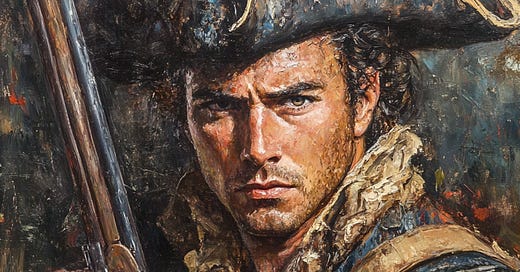The Second Amendment to the United States Constitution, ratified in 1791 as part of the Bill of Rights, reads:
“A well regulated Militia, being necessary to the security of a free State, the right of the people to keep and bear Arms shall not be infringed.”
Few lines of legal text have sparked as much debate or been subject to as much reinterpretation over the centuries. Originally conceived by the Founding Fathers in the wake of revolution, the Second Amendment reflected a very specific historical context, one deeply rooted in fear of standing armies, trust in local militias and the need to ensure that the government remained accountable to the people. Over the past 234 years, however, the amendment has undergone a transformation in meaning, particularly under the influence of the modern gun lobby. Although everyone seems to think they understand the Second Amendment, I thought a little stroll through its history might be informative.
The Founders' Intent: Militias and Civic Responsibility
To understand the Second Amendment, we must return to 18th-century America, a newly independent country wary of centralized authority. The Foundering Fathers had just fought a war against a monarch who used professional soldiers to impose his will. In that context, the Founders envisioned a security model based on “militias,” state-organized groups of citizen-soldiers, rather than a standing army.
Key figures such as James Madison and George Mason (a patriot and statesman) saw the amendment as a safeguard against tyranny. But their understanding of "arms" and "bearing arms" existed within the context of militia service, not individual self-defense or unfettered gun ownership.
Moreover, the words “well regulated” meant something different at the time than it does today. It referred not to bureaucratic control but to order, training and discipline. The right to bear arms, therefore, was tethered to civic responsibility, not personal freedom in the modern sense.
The Evolution of the Interpretation
For most of U.S. history, courts interpreted the Second Amendment within this collective framework. In 1939, the Supreme Court in United States v. Miller upheld a federal law banning sawed-off shotguns, ruling that the Second Amendment did not guarantee an individual the right to own weapons that did not have a “reasonable relationship to the preservation or efficiency of a well regulated militia.”
This interpretation held until the late 20th century, when political and cultural currents began to shift. A growing conservative movement, frustrated with federal regulation and urban crime, began to advocate for a broader, more individualistic understanding of the Second Amendment.
The Gun Lobby's Influence and the Rise of Individual Rights
Central to this reinterpretation was the National Rifle Association (NRA), which for much of the 20th century had focused on sportsmanship and marksmanship. But beginning in the 1970s, the NRA transformed into a powerful political force. Its new leadership, aligning with libertarian and right-wing elements, launched an aggressive campaign to redefine the Second Amendment as a guarantee of individual gun ownership for self-defense.
This effort was both political and intellectual. The gun lobby funded scholarship, lobbied lawmakers and supported judicial appointments, all aimed at reframing public and legal understanding of the amendment.
Their efforts culminated in the 2008 Supreme Court decision District of Columbia v. Heller. In a 5–4 ruling, the Court, breaking with centuries of precedent, declared that the Second Amendment protects an individual's right to possess firearms unconnected to militia service, particularly for self-defense in the home. Justice Antonin Scalia, writing for the majority, acknowledged the amendment's militia clause but ultimately rendered it an introduction rather than limiting phrase.
This landmark ruling marked a profound shift. The gun lobby had successfully recast the Second Amendment, severing it from its original context and replanting it in modern arguments about personal liberty and resistance to government regulation.
The Consequences of Reinterpretation
The transformation of the Second Amendment has had sweeping consequences. Gun ownership, once seen as a civic duty within a regulatory framework, is now championed as an absolute personal right. This absolutism has made it politically perilous to enact even modest gun control measures, despite growing public support in the face of mass shootings and rising gun violence.
Moreover, the shift has distorted historical memory. The Founders’ vision, a society in which arms were carried in defense of the collective, subject to state regulation, has been replaced by an ideology where firearms are symbols of individual freedom, even rebellion.
The Second Amendment began as a compromise born of a unique historical moment, intended to balance individual liberty with public order. The Founders imagined a nation of citizen-soldiers, not a heavily armed populace immune to regulation.
Over time, however, that balance has tipped. What was once a narrowly defined civic responsibility has been transformed, through strategic lobbying, legal reinterpretation and cultural mythmaking, into a sacrosanct individual right. In doing so, the gun lobby has not just changed laws; it has reshaped the nation’s understanding of its constitutional foundations.
The question remains whether America, with a population of approximately 343 million people who own approximately 428 million guns, can reconcile modern realities with the true spirit of its founding principles or are we just one giant militia of "citizen-soldiers" armed and ready, waiting to be called into civic service or civil war.
My column sees the world through the lens of Americana and focuses primarily on the culture and history of the United States. It uses the latest technological innovations combined with over seven decades of personal experience to create a vehicle that helps to communicate issues that have resonated throughout the history of the American experiment. My column is free to all but also offers a modest paid subscription for those who want to support the free flow of ideas.





